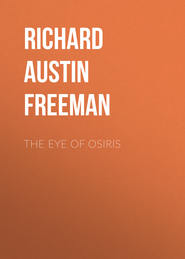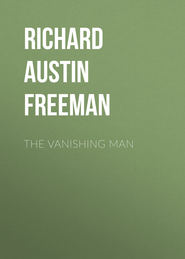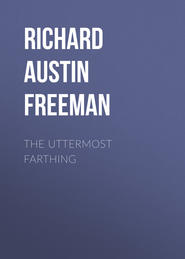По всем вопросам обращайтесь на: info@litportal.ru
(©) 2003-2024.
✖
The Red Thumb Mark
Настройки чтения
Размер шрифта
Высота строк
Поля
The judge turned over his notes with an air of quiet composure, writing down a word here and there as he compared the various points in the evidence. Then he turned to the jury with a manner at once persuasive and confidential—
"It is not necessary, gentlemen," he commenced, "for me to occupy your time with an exhaustive analysis of the evidence. That evidence you yourselves have heard, and it has been given, for the most part, with admirable clearness. Moreover, the learned counsel for the defence has collated and compared that evidence so lucidly, and, I may say, so impartially, that a detailed repetition on my part would be superfluous. I shall therefore confine myself to a few comments which may help you in the consideration of your verdict.
"I need hardly point out to you that the reference made by the learned counsel for the prosecution to far-fetched scientific theories is somewhat misleading. The only evidence of a theoretical character was that of the finger-print experts. The evidence of Dr. Rowe and of Dr. Thorndyke dealt exclusively with matters of fact. Such inferences as were drawn by them were accompanied by statements of the facts which yielded such inferences.
"Now, an examination of the evidence which you have heard shows, as the learned counsel for the defence has justly observed, that the entire case resolves itself into a single question, which is this: 'Was the thumb-print that was found in Mr. Hornby's safe made by the thumb of the prisoner, or was it not?' If that thumb-print was made by the prisoner's thumb, then the prisoner must, at least, have been present when the safe was unlawfully opened. If that thumb-print was not made by the prisoner's thumb, there is nothing to connect him with the crime. The question is one of fact upon which it will be your duty to decide; and I must remind you, gentlemen, that you are the sole judges of the facts of the case, and that you are to consider any remarks of mine as merely suggestions which you are to entertain or to disregard according to your judgement.
"Now let us consider this question by the light of the evidence. This thumb-print was either made by the prisoner or it was not. What evidence has been brought forward to show that it was made by the prisoner? Well, there is the evidence of the ridge-pattern. That pattern is identical with the pattern of the prisoner's thumb-print, and even has the impression of a scar which crosses the pattern in a particular manner in the prisoner's thumb-print. There is no need to enter into the elaborate calculations as to the chances of agreement; the practical fact, which is not disputed, is that if this red thumb-print is a genuine thumb-print at all, it was made by the prisoner's thumb. But it is contended that it is not a genuine thumb-print; that it is a mechanical imitation—in fact a forgery.
"The more general question thus becomes narrowed down to the more particular question: 'Is this a genuine thumb-print or is it a forgery?' Let us consider the evidence. First, what evidence is there that it is a genuine thumb-print? There is none. The identity of the pattern is no evidence on this point, because a forgery would also exhibit identity of pattern. The genuineness of the thumb-print was assumed by the prosecution, and no evidence has been offered.
"But now what evidence is there that the red thumb-print is a forgery?
"First, there is the question of size. Two different-sized prints could hardly be made by the same thumb. Then there is the evidence of the use of appliances. Safe-robbers do not ordinarily provide themselves with inking-slabs and rollers with which to make distinct impressions of their own fingers. Then there is the accidental mark on the print which also exists on the only genuine print that could have been used for the purpose of forgery, which is easily explained on the theory of a forgery, but which is otherwise totally incomprehensible. Finally, there is the strange disappearance of the 'Thumbograph' and its strange reappearance. All this is striking and weighty evidence, to which must be added that adduced by Dr. Thorndyke as showing how perfectly it is possible to imitate a finger-print.
"These are the main facts of the case, and it is for you to consider them. If, on careful consideration, you decide that the red thumb-print was actually made by the prisoner's thumb, then it will be your duty to pronounce the prisoner guilty; but if, on weighing the evidence, you decide that the thumb-print is a forgery, then it will be your duty to pronounce the prisoner not guilty. It is now past the usual luncheon hour, and, if you desire it, you can retire to consider your verdict while the Court adjourns."
The jurymen whispered together for a few moments and then the foreman stood up.
"We have agreed on our verdict, my lord," he said.
The prisoner, who had just been led to the back of the dock, was now brought back to the bar. The grey-wigged clerk of the court stood up and addressed the jury.
"Are you all agreed upon your verdict, gentlemen?"
"We are," replied the foreman.
"What do you say, gentlemen? Is the prisoner guilty or not guilty?"
"Not guilty," replied the foreman, raising his voice and glancing at Reuben.
A storm of applause burst from the gallery and was, for the moment, disregarded by the judge. Mrs. Hornby laughed aloud—a strange, unnatural laugh—and then crammed her handkerchief into her mouth, and so sat gazing at Reuben with the tears coursing down her face, while Juliet laid her head upon the desk and sobbed silently.
After a brief space the judge raised an admonitory hand, and, when the commotion had subsided, addressed the prisoner, who stood at the bar, calm and self-possessed, though his face bore a slight flush—
"Reuben Hornby, the jury, after duly weighing the evidence in this case, have found you to be not guilty of the crime with which you were charged. With that verdict I most heartily agree. In view of the evidence which has been given, I consider that no other verdict was possible, and I venture to say that you leave this court with your innocence fully established, and without a stain upon your character. In the distress which you have recently suffered, as well as in your rejoicing at the verdict of the jury, you have the sympathy of the Court, and of everyone present, and that sympathy will not be diminished by the consideration that, with a less capable defence, the result might have been very different.
"I desire to express my admiration at the manner in which that defence was conducted, and I desire especially to observe that not you alone, but the public at large, are deeply indebted to Dr. Thorndyke, who, by his insight, his knowledge and his ingenuity, has probably averted a very serious miscarriage of justice. The Court will now adjourn until half-past two."
The judge rose from his seat and everyone present stood up; and, amidst the clamour of many feet upon the gallery stairs, the door of the dock was thrown open by a smiling police officer and Reuben came down the stairs into the body of the court.
CHAPTER XVII
AT LAST
"We had better let the people clear off," said Thorndyke, when the first greetings were over and we stood around Reuben in the fast-emptying court. "We don't want a demonstration as we go out."
"No; anything but that, just now," replied Reuben. He still held Mrs. Hornby's hand, and one arm was passed through that of his uncle, who wiped his eyes at intervals, though his face glowed with delight.
"I should like you to come and have a little quiet luncheon with me at my chambers—all of us friends together," continued Thorndyke.
"I should be delighted," said Reuben, "if the programme would include a satisfactory wash."
"You will come, Anstey?" asked Thorndyke.
"What have you got for lunch?" demanded Anstey, who was now disrobed and in his right mind—that is to say, in his usual whimsical, pseudo-frivolous character.
"That question savours of gluttony," answered Thorndyke. "Come and see."
"I will come and eat, which is better," answered Anstey, "and I must run off now, as I have to look in at my chambers."
"How shall we go?" asked Thorndyke, as his colleague vanished through the doorway. "Polton has gone for a four-wheeler, but it won't hold us all."
"It will hold four of us," said Reuben, "and Dr. Jervis will bring Juliet; won't you, Jervis?"
The request rather took me aback, considering the circumstances, but I was conscious, nevertheless, of an unreasonable thrill of pleasure and answered with alacrity: "If Miss Gibson will allow me, I shall be very delighted." My delight was, apparently, not shared by Juliet, to judge by the uncomfortable blush that spread over her face. She made no objection, however, but merely replied rather coldly: "Well, as we can't sit on the roof of the cab, we had better go by ourselves."
The crowd having by this time presumably cleared off, we all took our way downstairs. The cab was waiting at the kerb, surrounded by a group of spectators, who cheered Reuben as he appeared at the doorway, and we saw our friends enter and drive away. Then we turned and walked quickly down the Old Bailey towards Ludgate Hill.
"Shall we take a hansom?" I asked.
"No; let us walk," replied Juliet; "a little fresh air will do us good after that musty, horrible court. It all seems like a dream, and yet what a relief—oh! what a relief it is."
"It is rather like the awakening from a nightmare to find the morning sun shining," I rejoined.
"Yes; that is just what it is like," she agreed; "but I still feel dazed and shaken."
We turned presently down New Bridge Street, towards the Embankment, walking side by side without speaking, and I could not help comparing, with some bitterness, our present stiff and distant relations with the intimacy and comradeship that had existed before the miserable incident of our last meeting.
"You don't look so jubilant over your success as I should have expected," she said at length, with a critical glance at me; "but I expect you are really very proud and delighted, aren't you?"
"Delighted, yes; not proud. Why should I be proud? I have only played jackal, and even that I have done very badly."
"That is hardly a fair statement of the facts," she rejoined, with another quick, inquisitive look at me; "but you are in low spirits to-day—which is not at all like you. Is it not so?"
"I am afraid I am a selfish, egotistical brute," was my gloomy reply. "I ought to be as gay and joyful as everyone else to-day, whereas the fact is that I am chafing over my own petty troubles. You see, now that this case is finished, my engagement with Dr. Thorndyke terminates automatically, and I relapse into my old life—a dreary repetition of journeying amongst strangers—and the prospect is not inspiriting. This has been a time of bitter trial to you, but to me it has been a green oasis in the desert of a colourless, monotonous life. I have enjoyed the companionship of a most lovable man, whom I admire and respect above all other men, and with him have moved in scenes full of colour and interest. And I have made one other friend whom I am loth to see fade out of my life, as she seems likely to do."
"If you mean me," said Juliet, "I may say that it will be your own fault if I fade out of your life. I can never forget all that you have done for us, your loyalty to Reuben, your enthusiasm in his cause, to say nothing of your many kindnesses to me. And, as to your having done your work badly, you wrong yourself grievously. I recognised in the evidence by which Reuben was cleared to-day how much you had done, in filling in the details, towards making the case complete and convincing. I shall always feel that we owe you a debt of the deepest gratitude, and so will Reuben, and so, perhaps, more than either of us, will someone else."
"And who is that?" I asked, though with no great interest. The gratitude of the family was a matter of little consequence to me.
"Well, it is no secret now," replied Juliet. "I mean the girl whom Reuben is going to marry. What is the matter, Dr. Jervis?" she added, in a tone of surprise.
We were passing through the gate that leads from the Embankment to Middle Temple Lane, and I had stopped dead under the archway, laying a detaining hand upon her arm and gazing at her in utter amazement.
"The girl that Reuben is going to marry!" I repeated. "Why, I had always taken it for granted that he was going to marry you."
"But I told you, most explicitly, that was not so!" she exclaimed with some impatience.









